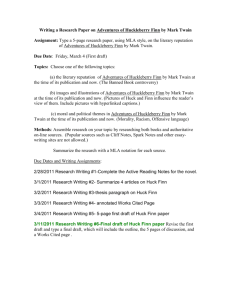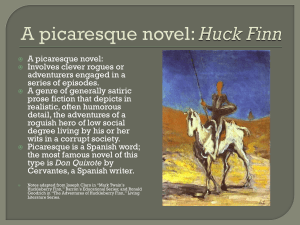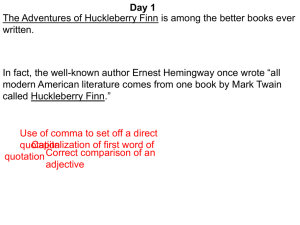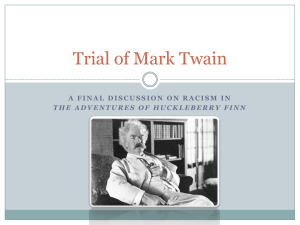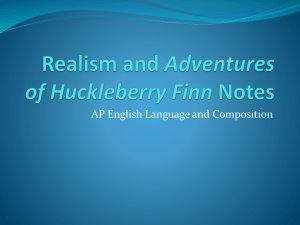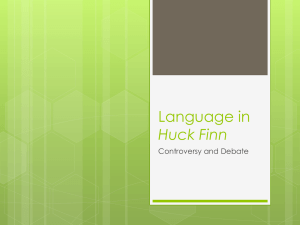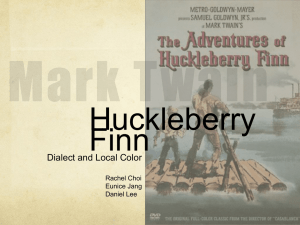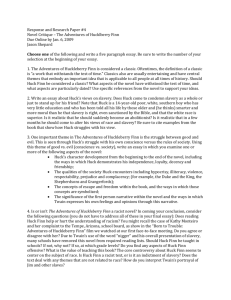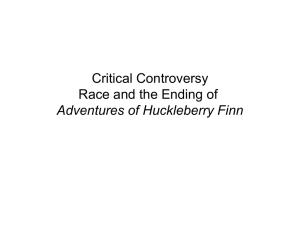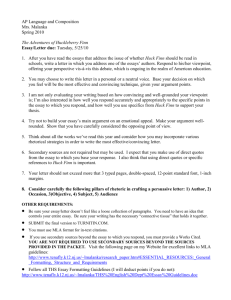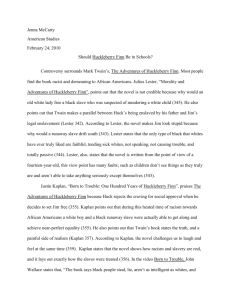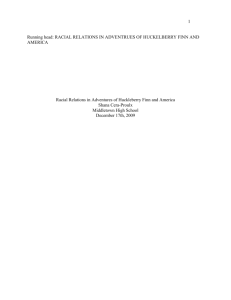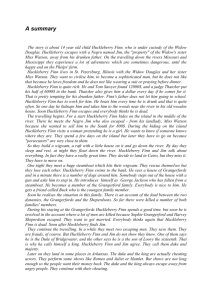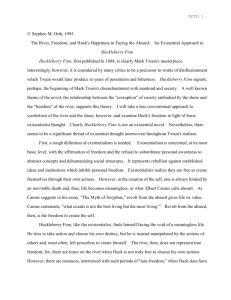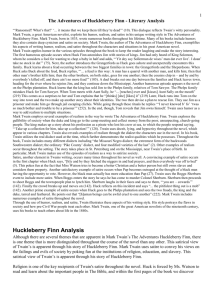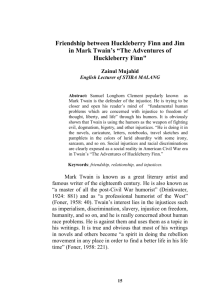Humanities 3 - La Habra High School
advertisement
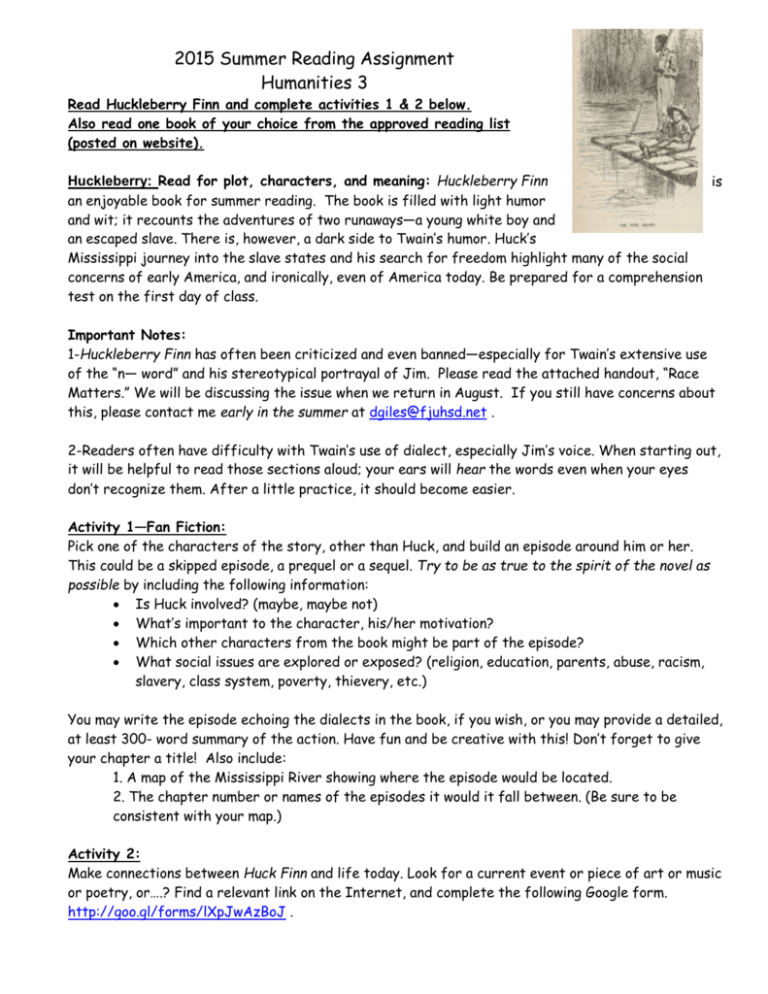
2015 Summer Reading Assignment Humanities 3 Read Huckleberry Finn and complete activities 1 & 2 below. Also read one book of your choice from the approved reading list (posted on website). Huckleberry: Read for plot, characters, and meaning: Huckleberry Finn is an enjoyable book for summer reading. The book is filled with light humor and wit; it recounts the adventures of two runaways—a young white boy and an escaped slave. There is, however, a dark side to Twain’s humor. Huck’s Mississippi journey into the slave states and his search for freedom highlight many of the social concerns of early America, and ironically, even of America today. Be prepared for a comprehension test on the first day of class. Important Notes: 1-Huckleberry Finn has often been criticized and even banned—especially for Twain’s extensive use of the “n— word” and his stereotypical portrayal of Jim. Please read the attached handout, “Race Matters.” We will be discussing the issue when we return in August. If you still have concerns about this, please contact me early in the summer at dgiles@fjuhsd.net . 2-Readers often have difficulty with Twain’s use of dialect, especially Jim’s voice. When starting out, it will be helpful to read those sections aloud; your ears will hear the words even when your eyes don’t recognize them. After a little practice, it should become easier. Activity 1—Fan Fiction: Pick one of the characters of the story, other than Huck, and build an episode around him or her. This could be a skipped episode, a prequel or a sequel. Try to be as true to the spirit of the novel as possible by including the following information: Is Huck involved? (maybe, maybe not) What’s important to the character, his/her motivation? Which other characters from the book might be part of the episode? What social issues are explored or exposed? (religion, education, parents, abuse, racism, slavery, class system, poverty, thievery, etc.) You may write the episode echoing the dialects in the book, if you wish, or you may provide a detailed, at least 300- word summary of the action. Have fun and be creative with this! Don’t forget to give your chapter a title! Also include: 1. A map of the Mississippi River showing where the episode would be located. 2. The chapter number or names of the episodes it would it fall between. (Be sure to be consistent with your map.) Activity 2: Make connections between Huck Finn and life today. Look for a current event or piece of art or music or poetry, or….? Find a relevant link on the Internet, and complete the following Google form. http://goo.gl/forms/lXpJwAzBoJ . Second Book- Choose and read one other book from the Humanities 3 Reading List: Choose a book you will ENJOY! (No note-taking or annotations allowed.) Bring it with you on the first day of class (along with Huck), and be prepared to answer a few test questions regarding the plot and main characters in it. If you have any questions or concerns, please contact me at dgiles@fjuhsd.net ; I check my email regularly. I look forward to an exciting year learning about our American society—about ourselves. Although the written element of this assignment is minimal, you will be accountable for having it ready and for having read both books on the first day of class. Be prepared for a short test that day. These assignments should be typed in MLA format, double spaced. Neatness matters! Sincerely, Mrs. Diana Giles Please scroll down to see the article on the next page. Consider which of the 4 perspectives best echoes your point of view. (No written assignment will accompany your reading of “Race Matters.”) Race Matters in Huckleberry Finn Huckleberry Finn is one of the most challenged books in American secondary schools. Below are some perspectives on the novel--which you may use as starting points for your own consideration. Which of these, if any, do you agree with? Choose one that most resonates with your perspective. Be prepared to argue for or against it. What points would you make to support your position? A. "It's not just a word. It carries with it the blood of our ancestors. They were called this word while they were lynched; they were called this word while they were hung from the big magnolia tree. That word, in the history of America, has always been a degrading word toward African Americans. When they were brought to America, they were never thought of as human beings in the first place, and this word was something to call a thing that wasn't human. So that's what they bring into the classroom to talk about. I just think it's utterly unconscionable that a school would think it's acceptable." —Beatrice Clark, President of Parent-Teacher-Student Association, Renton High School, WA. Qtd. in Roberts, Gregory. "'Huck Finn' a Masterpiece—or an Insult." Seattle Post-Intelligencer. 26 November 2003 <http://seattlepi.nwsource.com/local/149979_huck26.html> B. "There is no denying the rightness of Huck's decision to risk his soul for Jim. But there is no tangible reason to assume that the regard Huck acquires for Jim during his odyssey down the river is generalized to encompass all blacks. . . . It must be remembered that Huck does not adjudge slavery to be wrong; he selectively disregards a system that he ultimately believes is right. So when he discourses with Aunt Sally, he is expressing views he still holds. His emancipatory attitudes extend no further than his love for Jim. It seems valid to argue that were he given the option of freeing other slaves, Huck would not necessarily choose manumission." —Peaches Henry. "The Struggle for Tolerance: Race and Censorship in Huckleberry Finn." Satire and Evasion: Black Perspectives on Huckleberry Finn. Durham: Duke University Press, 1992. C. "When we teach Huck Finn and we identify it as a classic, we sort of participate in institutionalized racism. We perpetuate in an institutional manner certain stereotypes (and) myths, particularly myths concerning the African-American male." —Jocelyn Irby, professor of Languages, Literature, and Philosophy, Tennessee State University. Qtd. in Harris, Eugenia. "'Huck Finn ‘Still Pushes Buttons’, Professor Says." The Freedom Forum Online. 26 September 2000. <http://www.freedomforum.org/templates/document.asp?documentID=3637> D. "Despite the culture surrounding him, Twain understood deeply that racism is wrong. For Twain to have depicted in Adventures of Huckleberry Finn a young hero who questioned racial inequality and an African American who was caring, compassionate, and strongly committed to his freedom was revolutionary indeed. . . . Through the controversy surrounding this book alone, Twain brings into schools what all of us in this country desperately need, yet fear, most: discussions—frank discussions—about race, race relations, interracial relations, race language, racial stereotypes and profiling, and, ultimately, true and unadulterated racial equality." —Jocelyn Chadwick, professor of Education, Harvard University. "Why Huck Finn Belongs in Classrooms." Harvard Education Letter November/December 2000 <http://www.edletter.org/past/issues/2000-nd/huckfinn.shtml>


